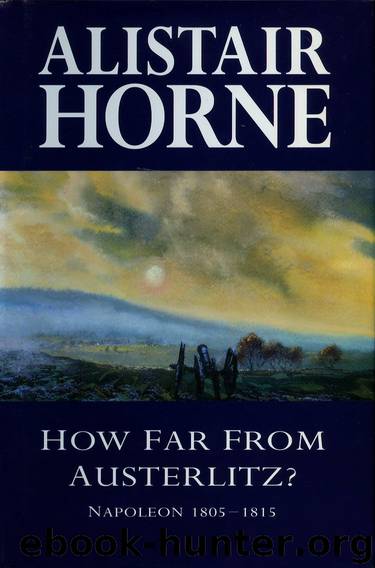How Far From Austerlitz? by Alistair Horne

Author:Alistair Horne
Language: eng
Format: epub
ISBN: 9781466884649
Publisher: St. Martin's Press
Published: 2017-01-03T05:00:00+00:00
ELEVEN
The Raft on the Niemen
1807
So war was no longer that noble and universal impulse of souls devoted to glory that he had figured it to be from Napoleon’s proclamations!
Fabrizio, The Charterhouse of Parma, by Stendhal
FOR ALL THE BRILLIANCE of Napoleon’s victory over Prussia, news of it was greeted with markedly less enthusiasm in Paris than that of Austerlitz. ‘So great was the public desire for peace,’ wrote the French historian, Louis Madelin, ‘that it even surpassed the gratification of pride.…’1 A deputation was sent by the Senate to Berlin, more to persuade Napoleon to make peace than to offer congratulations. Her economic problems still unresolved, France was wearying of war and wondering nervously – where next?
Although his army had been destroyed, his capital and most of his country occupied, and he himself was a fugitive at Königsberg in faraway East Prussia, Frederick William was still obstinately refusing to accept peace terms. His resolve had been hardened by the Tsar’s promise to come to his aid (belatedly) with 140,000 men. Further disquieting reports reached Napoleon that the conquered Austrians, too, were rearming at his rear. The danger of Russian intervention (backed, as usual, by English gold) was a very real one; so, to begin with, he found himself forced to secure the line of the River Oder, then to take preventive action across it. Next, the pursuit of the elusive Russians would lead him to the Vistula; and finally across that river and on to the Niemen, at the very gates of Holy Russia herself. Thus, instead of peace, another eight months of the grimmest campaigning Napoleon had yet experienced lay ahead of him. Such are the laws that govern military conquest, and the penalties which so often requite the ancient sin of hubris.
First, on 21 November, to strike what he intended to be a mortal blow against that implacable English paymaster before yet another coalition could be mounted against him, Napoleon issued the famous ‘Berlin Decrees’ ordering the closure of all continental ports to British trade. All commerce was to be seized, even letters ‘written in the English language’. To his brother, King Louis of Holland, he explained that he was ‘going to reconquer the colonies by means of the land’. The beginning of the much vaunted ‘Continental System’, this signified a land blockade of sea-power – but as such it was to backfire. Immediately there proved to be numerous black-market loopholes, where vast profits were to be made and in which King Louis himself was one of the worst offenders. Meanwhile, says Winston Churchill, the British blockade wrapped Napoleon’s Europe ‘in a clammy shroud. No trade, no coffee, no sugar, no contact with the East or with the Americans!’2 The greatest sufferers were the neutral mercantile nations, particularly the United States.
Pressed on by the logic of his own actions, Napoleon now moved into Prussian Poland to approach England’s one remaining ally, Russia, and compel her too to accede to the Continental System. He also had a political motive. Down
Download
This site does not store any files on its server. We only index and link to content provided by other sites. Please contact the content providers to delete copyright contents if any and email us, we'll remove relevant links or contents immediately.
| Africa | Americas |
| Arctic & Antarctica | Asia |
| Australia & Oceania | Europe |
| Middle East | Russia |
| United States | World |
| Ancient Civilizations | Military |
| Historical Study & Educational Resources |
Room 212 by Kate Stewart(5094)
The Crown by Robert Lacey(4793)
Endurance: Shackleton's Incredible Voyage by Alfred Lansing(4746)
The Iron Duke by The Iron Duke(4340)
The Rape of Nanking by Iris Chang(4191)
Joan of Arc by Mary Gordon(4082)
Killing England by Bill O'Reilly(3987)
Say Nothing by Patrick Radden Keefe(3966)
I'll Give You the Sun by Jandy Nelson(3421)
Shadow of Night by Deborah Harkness(3344)
Hitler's Monsters by Eric Kurlander(3321)
Mary, Queen of Scots, and the Murder of Lord Darnley by Alison Weir(3192)
Blood and Sand by Alex Von Tunzelmann(3181)
Eleanor & Park by Rainbow Rowell(3143)
Darkest Hour by Anthony McCarten(3113)
Margaret Thatcher: The Autobiography by Thatcher Margaret(3069)
Book of Life by Deborah Harkness(2914)
Red Famine: Stalin's War on Ukraine by Anne Applebaum(2912)
The One Memory of Flora Banks by Emily Barr(2850)
